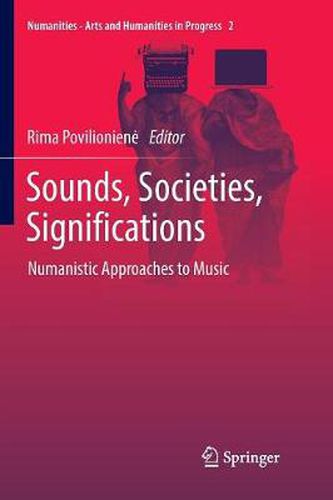Readings Newsletter
Become a Readings Member to make your shopping experience even easier.
Sign in or sign up for free!
You’re not far away from qualifying for FREE standard shipping within Australia
You’ve qualified for FREE standard shipping within Australia
The cart is loading…






This title is printed to order. This book may have been self-published. If so, we cannot guarantee the quality of the content. In the main most books will have gone through the editing process however some may not. We therefore suggest that you be aware of this before ordering this book. If in doubt check either the author or publisher’s details as we are unable to accept any returns unless they are faulty. Please contact us if you have any questions.
This edited book covers many topics in musicological literature, gathering various approaches to music studies that encapsulate the vivid relation music has to society. It focusses on repertoires and geographical areas that have not previously been well frequented in musicology. As readers will see, music has many roles to play in society. Music can be a generator of social phenomena, or a result of them; it can enhance or activate social actions, or simply co-habit with them. Above all, music has a stable position within society, in that it actively participates in it. Music can either describe or prescribe social aspects; musicians may have a certain position/role in society (e.g., the popstar as fashion leader, spokesman for political issues, etc.). Depending on the type of society, music may have a certain meaning or function (music does not mean the same thing everywhere in the world). Lastly, music can define a society, and it is not uncommon for it to best define a particular historical moment.
Case-studies in this work provide visibility for musical cultures that are rarely exposed in the dominant musicological discourse. Several contributions combine musicological analysis with insider-musician points of view. Some essays in the collection address the cultural clash between certain types of music/musicians and the respective institutional counterparts, while certain contributing authors draw on experimental research findings.
Throughout this book we see how musics are socially significant, and - at the same time - that societies are musically significant too. Thus the book will appeal to musicologists, cultural scholars and semioticians, amongst others.
$9.00 standard shipping within Australia
FREE standard shipping within Australia for orders over $100.00
Express & International shipping calculated at checkout
This title is printed to order. This book may have been self-published. If so, we cannot guarantee the quality of the content. In the main most books will have gone through the editing process however some may not. We therefore suggest that you be aware of this before ordering this book. If in doubt check either the author or publisher’s details as we are unable to accept any returns unless they are faulty. Please contact us if you have any questions.
This edited book covers many topics in musicological literature, gathering various approaches to music studies that encapsulate the vivid relation music has to society. It focusses on repertoires and geographical areas that have not previously been well frequented in musicology. As readers will see, music has many roles to play in society. Music can be a generator of social phenomena, or a result of them; it can enhance or activate social actions, or simply co-habit with them. Above all, music has a stable position within society, in that it actively participates in it. Music can either describe or prescribe social aspects; musicians may have a certain position/role in society (e.g., the popstar as fashion leader, spokesman for political issues, etc.). Depending on the type of society, music may have a certain meaning or function (music does not mean the same thing everywhere in the world). Lastly, music can define a society, and it is not uncommon for it to best define a particular historical moment.
Case-studies in this work provide visibility for musical cultures that are rarely exposed in the dominant musicological discourse. Several contributions combine musicological analysis with insider-musician points of view. Some essays in the collection address the cultural clash between certain types of music/musicians and the respective institutional counterparts, while certain contributing authors draw on experimental research findings.
Throughout this book we see how musics are socially significant, and - at the same time - that societies are musically significant too. Thus the book will appeal to musicologists, cultural scholars and semioticians, amongst others.